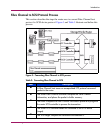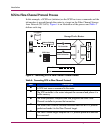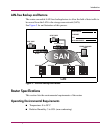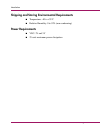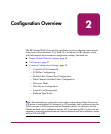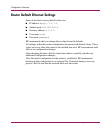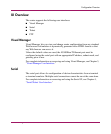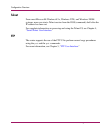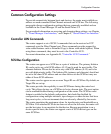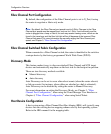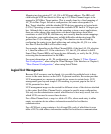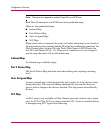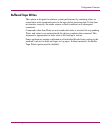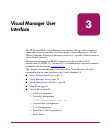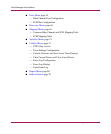
Configuration Overview
29Network Storage Router e1200-160
Common Configuration Settings
To provide connectivity between hosts and devices, the router must establish an
address on each connected Fibre Channel network and SCSI bus. The following
paragraphs discuss configuration settings that are commonly modified and are
available in the Visual Manager UI and the Serial/Telnet UI.
For procedural information on accessing and changing these settings, see Chapter
3, "Visual Manager User Interface," and Chapter 4, "Serial/Telnet User Interface."
Controller LUN Commands
The router supports a set of SCSI-3 commands that can be received as FCP
commands over the Fibre Channel port. These commands provide support for
value added features such as Extended Copy (a future value added option). When
using these commands, they must be sent to the Controller LUN.
For more information, see Appendix B, "Controller LUN Commands."
SCSI Bus Configuration
The router can appear on a SCSI bus as a pair of initiators. The primary Initiator
ID can be set to any valid SCSI address (0-15) and is used for most traffic. The
alternate Initiator ID can also be set to any valid SCSI address (0-15) and is for
use with high priority traffic. The Initiator IDs (primary and alternate) should not
be set to the same SCSI address and no other devices on the SCSI bus may use
either of these SCSI addresses.
The router can also appear as one or more Target ID on a SCSI bus. By default, no
Target IDs are set up.
The router provides the capability to reset SCSI buses during the router boot
cycle. This allows devices on a SCSI bus to be in a known state. The reset option
can be enabled/disabled during configuration of the router. The SCSI bus reset
feature is enabled in the default configuration, but should be disabled for
configurations using multiple initiators, tape changers or other devices that have
long reset cycles, or for environments that are adversely affected by bus resets.
The router negotiates the maximum values for transfer rates and bandwidth on a
SCSI bus. If an attached SCSI device does not allow the full rates, the router will
use the best rates it can negotiate for that device. Because negotiation is on a
device-specific basis, the router can support a mix of SCSI device types on the
same SCSI bus.



